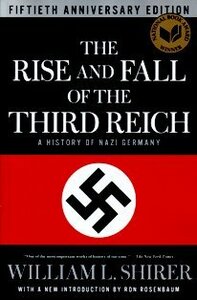Take a photo of a barcode or cover
This was a really interesting book - most World War II information seems to come from an Allied point of view, rather than from someone who was living in Germany at the time. It was tedious reading at times just because the level of detail was so great.
I was fascinated by all the "small" things on which the rise and fall of Hitler seemed to hinge at times.
I was fascinated by all the "small" things on which the rise and fall of Hitler seemed to hinge at times.
I got bogged down around the 55% mark. While this book is worth reading, and very compelling in places, in others it drags to a halt. I shouldn't complain about it because Shirer was trying to complete the details for the ages. And after all, this is non-fiction. I plan to finish this book eventually - I stopped reading right after the endless diplomatic maneuvers seem to have reached an end, and actual war is breaking out.
Perhaps I will have more success with a non-PDF version. Reading 1200-page PDFs on an e-reader can be tiring, especially when you have to perform a factory reset halfway through and then paginate back to your spot. I was not happy with Kobo about that.
Perhaps I will have more success with a non-PDF version. Reading 1200-page PDFs on an e-reader can be tiring, especially when you have to perform a factory reset halfway through and then paginate back to your spot. I was not happy with Kobo about that.
Densely detailed, this is not a quick read — but an important one. I really appreciate the level of detail and the comparison of what the author saw from the outside with personal diaries and other documents recovered from the Third Reich.
There is so much I could say about this book…but two other quotes pretty much sum up my feelings:
“Those who do not learn history are doomed to repeat it.”
(George Santayana)
“It has been said that for evil men to accomplish their purpose it is only necessary that good men should do nothing.”
(attributed to many, including Reverend Charles F. And and Edmund Burke)
There is so much I could say about this book…but two other quotes pretty much sum up my feelings:
“Those who do not learn history are doomed to repeat it.”
(George Santayana)
“It has been said that for evil men to accomplish their purpose it is only necessary that good men should do nothing.”
(attributed to many, including Reverend Charles F. And and Edmund Burke)
Exhaustive account. Informative and infuriating. Hindsight is a terrible burden sometimes, but why, oh why, did people continue to believe--against all evidence--in such a chronic liar and insane person?
A riveting account of Hitler's rise to power. It has its dense sections, certainly, but the overall scope of the book will leave you awed.
Finished first third of book for Book Club. Can't wait to discuss it.
slow-paced
Well it's been nearly a year since I started this, and it is hard to rate this absolute behemoth anything but 5 stars. It is the definitive text documenting Hitler and the Nazi party's reign of terror. You might think you know enough about WW2 and the Holocaust from the many school readings, but it is so, so much worse. If you believe in the importance of knowing our history, the true value of this book can be divided into its two general parts (in brief summaries):
The rise of the Third Reich:
Knowing exactly how they rose to power, the tactics used, the words spoken, actions taken, and comparing it to what we see today both domestically and internationally. The importance of strong international relations, and why you should care.
The fall of the Third Reich:
Everyone should be fully aware and educated of just how horrible humanity can be, so it doesn't happen again. The importances of checks and balances within a political system.
It was a slog at times, but there was really no fluff. 60 hour audiobook. No fluff. How. Shirer isn't around these days, but sticking it out as an American foreign journalist and living in Nazi Germany during these times and trying to report on it as objectively as he could is just wild. 10/10 wouldn't read/listen again but very glad I took the plunge. It’s rough going at times but I think this is something everyone should attempt to read.
The rise of the Third Reich:
Knowing exactly how they rose to power, the tactics used, the words spoken, actions taken, and comparing it to what we see today both domestically and internationally. The importance of strong international relations, and why you should care.
The fall of the Third Reich:
Everyone should be fully aware and educated of just how horrible humanity can be, so it doesn't happen again. The importances of checks and balances within a political system.
It was a slog at times, but there was really no fluff. 60 hour audiobook. No fluff. How. Shirer isn't around these days, but sticking it out as an American foreign journalist and living in Nazi Germany during these times and trying to report on it as objectively as he could is just wild. 10/10 wouldn't read/listen again but very glad I took the plunge. It’s rough going at times but I think this is something everyone should attempt to read.
emotional
informative
reflective
medium-paced
This is one of the most important books that I have ever read. Read this book if you want to have a very good understanding of Adolf Hitler and WWII.
"The power which has always started the greatest religious and political avalanches in history rolling has from time immemorial been the magic power of the spoken word, and that alone.
The broad masses of the people can be moved only by the power of speech. All great movements are popular movements, volcanic eruptions of human passions and emotional sentiments, stirred either by the cruel Goddess of Distress or by the firebrand of the word hurled among the masses; they are not the lemonade-like outpourings of the literary aesthetes and drawing-room-heroes." –Mein Kampf
Shirer’s ability to coalesce so many different sources and events into a cogent, gripping narrative makes this one of the best history books I’ve read. He provides the crucial social/historical context to make sense out of the circumstances that fed the rise of the Nazis and the seeming willingness of the German population. As he lived through this time period while reporting from Germany, his personal experience blends insightfully with the accuracy allowed by hindsight and access to the troves of official documentation and interviews available after the war. While telling the story, he is able to highlight crucial decision points and unique social situations. More impressive, is how effectively he takes advantage of the opportunity to delineate the frequency and degree of lies and misrepresentations the Nazis foisted upon their own people and the international stage (during and after the war). He traces the political developments for nearly a third of the book after outlining the intellectual roots of the Third Reich, which in Hitler’s mind, became a kind of extreme, muddled stew: “… the glorification of war and conquest and the absolute power of the authoritarian state; the belief in the Aryans, or Germans, as the master race, and the hatred of Jews and Slavs; the contempt for democracy and humanism.” The philosophies of thinkers like Treitschke and Hegel fed perfectly into the kind of megalomaniacal vainglory quintessential to the Fuehrer’s ego and ambitions.
For such a large book, it reads extremely well. It took me a long time to finish simply because I kept putting it down to read fiction, but at no point did I find it tedious or boring. Shirer, himself, writing in the afterword, was surprised at how popular the book ended up being. Throughout, one also gets the sense of how fickle history is, made up out of luck/chance, more so than choice and will. The beerhall putsch, military mistakes (the inexplicable German lull that made the evacuation at Dunkirk possible), foresight (Britain’s development of their airforce and radar prior to the war), narrowly avoided assassination attempts, etc. One is left marveling if the entire shape of the 20th century might not have turned out vastly different had Hitler just made it into art school!
Shirer dedicates a whole section to the atrocities of the New Order: the Holocaust (from ghettoes to extermination camps), the ruthless treatment of prisoners, the cold-blooded murder of submissive enemies, and the intent to essentially eliminate or enslave all who were not of the German race. Hitler doesn’t even blink at the thought of millions of Russians starving should his plans succeed. This is a level of such cold inhumanity to be nearly incomprehensible. It may explain, in part, why Allied powers did not react more quickly when the German empire began its expansion. The heartless efficiency with which they went about everything from gassing Jews to plundering conquered cities is nothing short of astounding.
To call my own knowledge of history “lacking” would be generous. Thus, I was caught up time and time again while reading by my own ignorance. Examples abound, but the three biggest were: 1) My complete ignorance of Polish history. As Hitler prepared to invade, I didn’t really understand the extent of his hatred for the Polish. I asked myself what I knew about Poland. Uh, other than it’s location, next to nothing. 2) I never really understood why Japan attacked the U.S. beyond knowing they had aligned themselves with the Germans and were the closest to Pearl Harbor. I knew nothing about the Tripartite Pact, nor about U.S. sanctions in response to Japan’s occupying French Indochina (in short, Germany hoped Japan would help keep the U.S. out of the war, and Japan seems to have used having German and Italian backup as the excuse they needed to buck the U.S.). And, 3) Truly internalizing the shifting boundaries and territories preceding and during WWII is particularly hard from the vantage point of 21st century America. I grew up thinking of countries and their boundaries as pretty stable (this, I will blame on my educational experience and the insulated nature of U.S. news and media).
Eerily, there are quite a few parallels between Nazi Germany and today’s world: totalitarian states like North Korea controlling media and culture exclusively; politicians and leaders exploiting public fears by blaming and ostracizing specific groups of people (gays, immigrants, refugees, Muslims, etc.); appeals to nationalistic and/or racial pride/identity; etc. Even Shirer, writing in 1990 for this 30th anniversary issue of the book questions how much Germany has changed. Granted he was writing before re-unification and the EU, but all this merely underlines the continued significance of international security arrangements like NATO.
For those looking for fiction dealing with WWII, I would highly recommend: The Plot Against America, HHhH, Night, This Way to the Gas Ladies and Gentlemen, and Maus I & II.
--------------------------------------------------------------
WORDS OR PHRASES I HAD TO LOOK UP
abrogation | hakenkreuz | putsch | mountebank | apodictic | praetorian | peroration | Vernichtungslager | quisling | Untermeschen | funicular | gauleiters | Wotan at Valhalla





